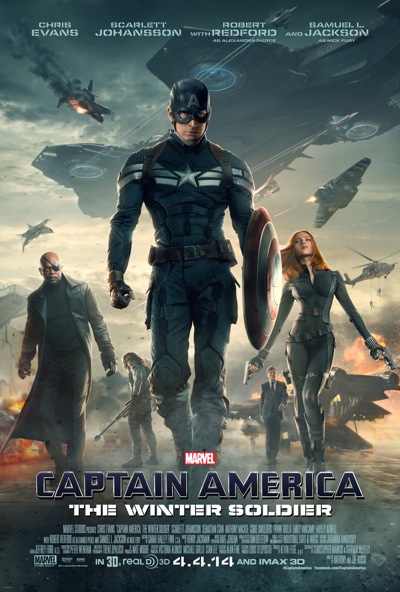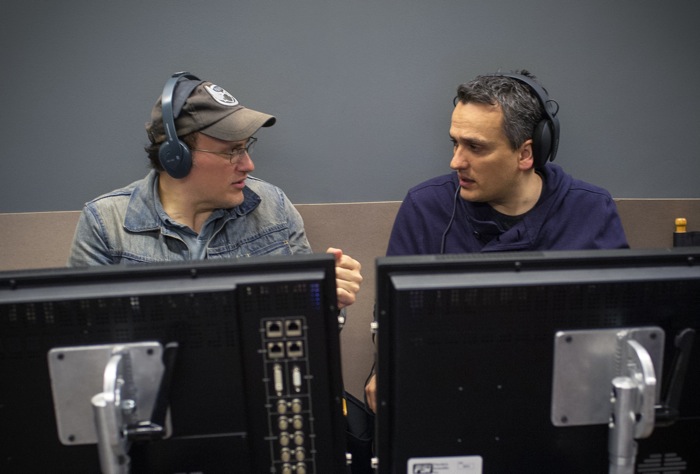
The collective "Why these guys?" that went up after Joe and Anthony Russo were hired to direct CAPTAIN AMERICA: THE WINTER SOLDIER has been answered: because they possess the skill set to deliver a grounded, more thoughtful superhero movie without sacrificing the superhuman action we've come to expect from Marvel Studios. In a significant departure from the Golden Age aesthetic of Joe Johnston's CAPTAIN AMERICA: THE FIRST AVENGER, the Russos have plopped Cap into the middle of a conspiracy-laced political thriller; in many ways, THE WINTER SOLDIER is THREE DAYS OF THE CONDOR, only this time Joseph Turner is a super-soldier capable of singlehandedly neutralizing a dozen trained killers... in an elevator... with one hand magnetized to the wall.
It's clear that Marvel's primary edict is to keep things fresh. They've learned from the flameouts of the BATMAN and SPIDER-MAN franchises, and are careful to never get complacent: ergo, IRON MAN THREE dealt with Tony Stark's post-AVENGERS anxiety, THOR: THE DARK WORLD went unabashedly cosmic and, now, CAPTAIN AMERICA: THE WINTER SOLDIER is addressing the very real issue of unwarranted government surveillance. The trick here is to keep audiences invested in these standalone stories without tilting too heavily towards next summer's calling-all-cars payoff, THE AVENGERS: AGE OF ULTRON. THE WINTER SOLDIER does this better than any Marvel movie thus far; the two most important relationships in the film are the burgeoning friendship between Steve Rogers and Sam Wilson (aka The Falcon), and the broken brotherhood shared by Steve and Bucky Barnes (aka The Winter Soldier). By the end of the film, we're as eager for the next Captain America movie as we are for the reassembling of The Avengers. Marvel's got their hooks in deep.
Though this is only the third feature directed by the Russos (following WELCOME TO COLLINWOOD and YOU, ME AND DUPREE), they've done a great deal of quality television over the years. So while the scope has dramatically increased, the playfulness of shows like COMMUNITY and ARRESTED DEVELOPMENT peeks through here and there. Start to finish (and despite its 136-minute runtime), this is the most briskly paced of the Marvel movies; even the obligatory second-act information dump breezes by. The Russos are a perfect fit for this universe; they're already signed up for the third Cap film, and, in talking to them during THE WINTER SOLDIER press day, they couldn't be happier about it.
This was a quickie ten-minute interview, so don't expect in-depth process talk here. I should also warn you there are spoilers in the last two questions. I'll give you a heads-up before I get to them.

Jeremy Smith: My peak comic book reading years were 1980 to 1989, and my favorites in the Marvel universe were the X-Men, Thor, Spider-Man, Daredevil and a few others. But outside of The Avengers, I was never into Captain America. It's the films and Ed Brubaker's work that, for the most part, have made me a fan. What is it about Cap that makes the character relevant now?
Joe Russo: It's funny what you just said, because that was almost my identical upbringing. Those were my peak years, too; I graduated high school in 1989 and started collecting in '80, so I was really into the John Byrne run on THE UNCANNY X-MEN. Other characters were peaking at that time, but Cap is interesting because, for me, the problem I had with him when I was younger was that he felt very jingoistic and simplistic. He felt like a boy scout. Up to that point, with the Golden Age and Silver Age interpretations, he never had a great run. I was supremely influenced by Frank Miller's work when I was a kid. I love deconstructing superheroes, and Cap didn't have a deconstruction at that point. It wasn't until Brubaker and [Mark] Millar got their hands on him in the last ten to twelve years that he's gone through his postmodern reinvention. I think that happens to tie up with the movies, which Kevin Feige is very smartly pulling from that material. Joe Johnston did a fantastic job with the first movie as a love letter to the time period and the Golden Age origins of the character, but what was unique for us was that we got to do a postmodern reboot in the middle of a franchise. And I think Cap works now because we're living in really complicated political times, so you can take what would otherwise feel jingoistic and turn that into commentary. For people who like a little bit more texture with their storytelling, you can create a more textured version of Captain America.
Anthony Russo: I think it's also important to consider where the country was in those two periods. '80 to '89 is Ronald Reagan finally winning the Cold War against the collapsing Soviet Union. Those were good days with a good economy and all of that. Now we're post-9/11, and we're in the age of preemptive strikes and the NSA and all kinds of very complicated things that make our identity as a country vulnerable and paradoxical in a lot of ways. It's a more relevant time to look at Captain America than the '80s.
Jeremy: But Captain America doesn't change. He sees the world in a certain way, and it's a way we like to think we look at the world as Americans. So in a way, you can use him as a character through which you might get people to reassess their views, to question what they might see as the country's purity of purpose.
Joe: Definitely. He's a character motivated into action based on principle, right? I think most Americans like to believe they are motivated into action based on principle. I think that was clearly the case in World War II, where you had a clear bad guy; it was easily black-and-white back then. Since then, we've come to learn that there are much more covert agendas at work with our government, and that motivating on principle is not as easy as it once was. What are those principles that we are motivating off of? Is anyone really motivating off principle anymore? Even though that's the story we spin to the rest of the world, now we all know through Wikileaks that there is actual documentation that we're lying.
Anthony: Captain America is also motivated by putting the greater good ahead of his own well-being. And we're living in a day and age where, as a country, it seems like we're serving our self-interest first, whereas during World War II we were coming to save the rest of the world.
Jeremy: It's interesting to revisit that murkiness via the lens of '70s paranoid thrillers. You guys have been aboveboard in referencing THREE DAYS OF THE CONDOR - if only because you cast Robert Redford. But this is also fun as a cinephile. I remember asking you on set if you were going to sneak in any easter eggs for film buffs, and you said there'd be a subtle one from CONDOR. Maybe it's cheating to ask, but I didn't see one. I was kind of hoping you'd have a framed picture of one of Faye Dunaway's photographs - the ones Sydney Pollack uses during the love scene.
Anthony: There is one reference. It's not CONDOR, but it's a Redford.
Jeremy: The ALL THE PRESIDENT'S MEN bit between Cap and Nick Fury?
Anthony: That's it.
Joe: There's also a bottle of Newman's Own salad dressing in Redford's refrigerator.
Jeremy: Aw! That's very sweet.
Joe: There are a couple of sneaky ones in there.
Jeremy: In terms of the action in the film, how did you manage the tone between realistic-looking action and overt superhero action? And how did you arrive at your take on The Falcon?
Anthony: I love the question you're asking because I think a lot of our work has been about managing complicated tones. That's what we're always drawn to creatively, whether it be in comedy or otherwise. At the end of the day, we started with the grounded because we're starting as a superhero movie, so the job at first for us was, stylistically, how do we ground that idea? Once we explored how far we could push it in that direction, we thought, "Okay, now where do we blow it up and have the superhero fun?"
Joe: It breaks down pretty cleanly in the movie. The first two acts are a political thriller, and that's where we really committed to practical execution of the stunts and the f/x in the film. All of the action sequences up to the end of Act II are extremely practical; it's stuntmen jumping from car to car, cars flipping and stuff like that. And the third act, once the mystery is revealed, it becomes an adventure film or a mission movie. I always say that Jim Brown had a very specific mission in THE DIRTY DOZEN; he had to get that grenade in the chimney or else all the Nazis were going to escape. It's the same thing here: Cap has to get that grenade in the chimney or Hydra's going to kill a couple million people. It fell into very clean execution of the film. You get that more grounded action in the first ninety minutes, and it blows up into a superhero film.
I'm glad you brought up The Falcon, because, as a comic book fan, that was something that was incredibly important to us and we were very emotional about. I never loved him as a character when I was a kid only because I hated his outfit. I thought it was ridiculously dated. And he had an absurd backstory that was vaguely racist and stereotypical. I also didn't like that his powers were mystical, that he could talk to birds. I wanted him to be grounded like Cap was grounded. These were two soldiers that had unique gifts, but they're soldiers and they're militaristic gifts. For us, that was the whole approach to how we came up with The Falcon. You already have Thor and Iron Man, and they're pretty spectacular to watch on the screen, so we were like, "How do we bring him into a universe where those guys exists, and where, visually, he is kick-ass?" So that's where we came up with the idea of the jet pack and he's moving at 200 mph, and he's agile and can turn on a dime, whereas Iron Man has to use his thrusters to slow down. There's a difference between those two characters.
Jeremy: You've worked in a lot of cameos from the comedy world, people like D.C. Pierson and Danny Pudi. I don't believe I caught a name with Pudi's character, so I have to ask: is that Abed?
(Both laugh.)
Joe: That's interesting. I don't know if we gave him a name. I think we just called him a controller. I'm sure Dan [Harmon] and Chris McKenna will find some metaphysical application to his appearance in the movie.
I like the idea that Abed has somehow strayed into a Marvel superhero movie. As far as I'm concerned, that's Abed.
CAPTAIN AMERICA: THE WINTER SOLDIER hits theaters April 4th, 2014. Carve out time for two viewings, because you're going to want to see it again as soon as it's over.
Faithfully submitted,
Jeremy Smith
